
A Summons To Perdition by John L. Work
 A Summons To Perdition is not a happy book. It is, as its subtitle states, a “novel of suspense.† John Work did a lot of research in writing this book and one can only hope that the dire picture he paints about the degree to which radical Islam has infiltrated American society and government is merely Work’s construct for the purposes of making a good story. If not, Work had best watch out for himself.
A Summons To Perdition is not a happy book. It is, as its subtitle states, a “novel of suspense.† John Work did a lot of research in writing this book and one can only hope that the dire picture he paints about the degree to which radical Islam has infiltrated American society and government is merely Work’s construct for the purposes of making a good story. If not, Work had best watch out for himself.
A Summons To Perdition is both entertaining and informative. It provided the author with a vehicle with which to educate his readers on the threat posed to western civilization by “the religion of peace.â€
Work’s protagonist shares some of the author’s own background as a retired police detective with a deep suspicion of the Muslim religion. Speaking through his character J.D. Welch, Work pulls no punches and backs up his opinions with references to scholarly works on jihad and historical events. But A Summons To Perdition is not a diatribe looking for novel, it is actually a pretty good story, with a plot perhaps too believable for comfort.
The author does not hide behind his character in his introduction, but tells it like he sees it:
The tale I’ve written here is fictional, although I’ve mentioned the names of some real people and places in the narrative. It is an ugly, violent story. But, there’s no other way to tell it. I’ve based it in historical fact, on my own experiences as a retired investigator of crimes, and the writings of the scholars of Islam, whom I have come to respect and admire for their intellect, courage, and forthrightness in telling the truth. By writing the truth, they have all placed themselves at great risk, because any analytical exposure of Islamic doctrine by Infidels is grounds for a death fatwa— it is a crime of blasphemy.
Work has done a good thing in writing this book, since reading the works he references in his story would not be a lot of fun, however important their contents.
- Shariah:Â The Threat To America by Frank Gaffney
- The Legacy of Jihad by Andrew Bostom
- Oriental Jewry And The Dhimmi Image in Contemporary Arab Nationalism by Bat Ye’or
- Eurabia by Bat Ye’or
- Jihad Under The Turks and Jihad Under the Mughals by K.S. Lal
The author manages to convey some of what’s in these books without overwhelming the story or the reader with too much detail. In addition to using dialog to explain some of the history of Islam, Work also prefaces each chapter with selected quotes from the Quran, the aforementioned source books, and historical or contemporary figures.
Some of the chapter introduction materials in this book are taken directly from the Koran. I recommend that you don’t skip over them. What most of the American public doesn’t know about Islam, jihad and sharia, I lay directly at the feet of the American Press Corps which has for years inexplicably and deliberately concealed from our populace the reasons and driving forces behind the new worldwide jihad movement, and in so doing have provided the enemy safe harbor by ignoring the codified mainstream Muslim doctrines that threaten our survival as a free society. The novel is about crime, suspense, survival and war.
Work doesn’t bother to put much gloss on his opinions. In fact, it is one of the aspects of A Summons To Perdition that makes it refreshing to read.  His main character does what is required of him and doesn’t stop to second-guess himself. Confronted with an evil, murderous Muslim kidnapper about to murder 5 young women, Welch bashes in his skull with a baseball bat and doesn’t stop until that man is dead. He similarly takes no chances when two Muslim assassins break into his home seeking retribution. This is some of the brutal, ugly violence of which the author warns in his introductory remarks.
Unlike Welch, who was defending himself or others, the terrorist rapists justify their actions as being in the service of world-wide jihad. Welch wisely recognizes the upside-down nature of things as he is forced to flee for his life. Work incorporates his indictment of the American Press Corps quoted above into his story, by enumerating and linking some of the acts of terrorism perpetrated by Muslims in recent times. But perhaps most disturbing was Work’s recounting of the many instances where Muslims have threatened and bullied people who dared to speak out against them, either through cowed governments like that of England or directly through fatwas against the lives of those they target. Some of the things mentioned in the book include:
- The firing of Major Stephen Coughlin (the Pentagon’s foremost expert on Islamist doctrine, at the behest of Hesham Islam .
- The fatwa against dutch politician Geert Wilders
- Threats to the life of Danish cartoonist Kurt Westergaard
- Sharia law in parts of England
A Summons To Perdition is not one of those books that wraps everything up in a nice little bow and in which everyone lives happily ever after. The story reflects too much reality for a neat and tidy resolution, much like the situation in which western civilization now finds itself in regard to Islam. But before any action is possible, the threat must be perceived as real and imminent. That’s what Work’s book is all about.
 The posts are coming!
The posts are coming!


0 comments
Kick things off by filling out the form below.
Leave a Comment